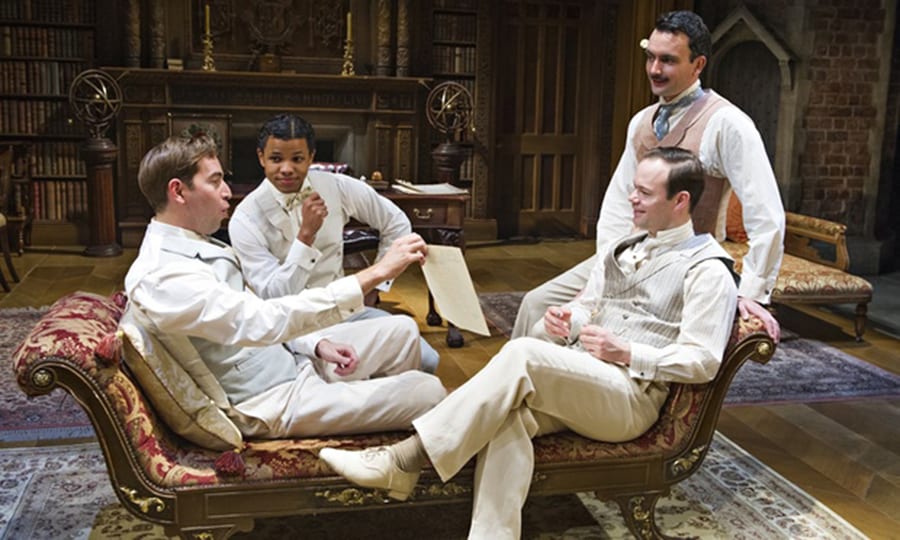The RSC has paired new productions of Love’s Labours Lost and Much Ado About Nothing to promote the idea that the latter is the mysterious lost play Love’s Labours Won. Certainly, for centuries, everyone has noted various connections of theme between the plays; and it has always been said that Rosaline and Berowne are a sketch for Beatrice and Benedict.
For those reasons alone it’s interesting to see Edward Bennett and Michelle Terry take on both roles. I attended a matinee of the first and an evening performance of the second on the same day. I was impressed by the committed ensemble work of the actors, the evocative sets and costumes of Simon Higlett, the terrific music by Nigel Hess. Because of the anniversary year of the outbreak of World War One, the first play was set in July 1914 and the second just after the war so that the men of Messina were returning from the carnage of World War I.
It’s a clever ploy, and it enhances enjoyment of both plays in some ways; but it doesn’t really convince me of the premise. Nor do the two plays being done together entirely work. They don’t really illuminate each other except peripherally. But the echoes across the two plays were good to experience on the same day and in a unified conception of the two plays; and the actors were able to cope with all the verbal sparring and wit, all the conundra in the dialogues, with ease and to give much pleasure. They were also able to convey real emotional understanding of their characters. By the end of the day I adored Beatrice and Benedick, felt immense sympathy for poor Dogberry, and wondered how Hero and Claudio were going to fare in marriage after he and the Prince had been such jerks, Claudio almost falling for Don John’s first trick of claiming the Prince was going to betray his trust in wooing Hero and then not even questioning the second treachery. As for Love’s Labours Lost, those four young men certainly have remained callow Edwardian schoolboys (Eton? Oxford?) as the play begins; and I now wish Love’s Labours Won would turn up because clearly they have a learning process ahead of the with which I think the lost play must deal.
In fact, I am pretty convinced after the abrupt ending to Love’s Labours Lost that the play referred to as Love’s Labours Won is not a spare title for Much Ado About Nothing but actually a lost play. Love’s Labours Lost felt to me as if it hit a surprise climax, rather like the scene in Much Ado in the church that spins the play into a darker and other sphere. I propose therefore that the final scene of Love’s Labours Lost is the climax of a ten act structure, the climax of a play and its sequel, and that Love’s Labours Won has to be a real sequel continuing the same story with the same characters a year later, not just another, later and better play that happens to share some of the concerns, themes and even character types of the first.
That said, I enjoyed the experience of the two plays enormously. They are good to see together because of the way Christopher Luscombe has conceived the interpretations and cross references; they are certainly worth a trip to Stratford.
There are many felicities in Luscombe’s approach, not the least in some of the cross castings, among them Nick Haverson as Costard in the first and Constable Dogberry in the second. Sam Alexander, who plays the King of Navarre charmingly in the first play, turns into the wicked Don John in the second. Everyone on the stage is deserving of praise.
The RSC is continuing with its policy of intelligent and integrated repertoire that tends to cross-fertilise ideas and also with an exemplary eye for casting. Christopher Luscombe’s pacing tends to be a bit on the fast side, which is not a bad thing with these comedies, and he has a great sense of invention for business that fleshes out the characterizations and the action. This is a thoroughly intelligent and enjoyable presentation of both plays and well worth seeing for oneself.
Love’s Labours Lost and Love’s Labours Won (Much Ado About Nothing) continue in repertoire at the RSC in Stratford-upon-Avon until 14 March 2015.

